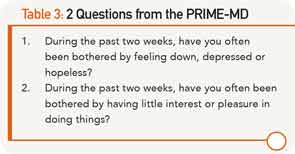The test does not come with a standard cut-off point for a positive screen, which is to be determined by the examiner based on information about the context of the clinical setting. Administration of the BDI-PC to 120 patients making non-mental health-related visits to physicians found that a cut-off score of 4 out of a possible 21 points was clinically significant.23 In this study population, the sensitivity was .97 with a specificity of .99.23
Another frequently used screening tool is the Hospital Anxiety and Depression Scale (HADS), which was designed to be used with patients who are receiving medical care. Thus, the tool has the advantage that it does not contain any questions that refer to somatic symptoms. This test is the most widely tested of all the screening tools among patients with co-occurring medical conditions and has strong validity when compared with other validated tools. Further, the findings remain valid when compared to the structured mental health interview.24
The HADS contains 14 items, seven for depression and seven for anxiety. Taken together, they reflect mental disorders. Each item is scored on a four-point scale from 0 (not present) to 3 (present to a considerable degree). One review found that a cut-off score of 5 for depression produced optimal specificity and sensitivity.21 However, another investigation in patients seen in general medical practice found the best information came with a cut-off score of 8 or higher.11
The CES-D was developed for use in a general medical setting. It is a 20-item scale that asks the patient how frequently they have experienced certain symptoms over the past week. Each item is scored from 0 (no days or rarely) to 3 (five to seven days). Thus, it yields a score from 0–60. A cut-off score of 16 or greater is highly indicative for depression. Some of the 20 questions, such as lack of appetite, having restless sleep and feeling everything required great effort, ask for symptoms that overlap with symptoms of arthritis. Studies indicated that the CES-D had only moderate agreement with a structured interview.
In a study of elderly patients, the sensitivity was 100% and the specificity 88%, compared with a sample of patients in a primary clinic in which the specificity was 79.5% and the specificity was 71%.25 In patients with RA, a cut-off score of 19 was most appropriate due to overlapping symptoms of RA and depression.26

